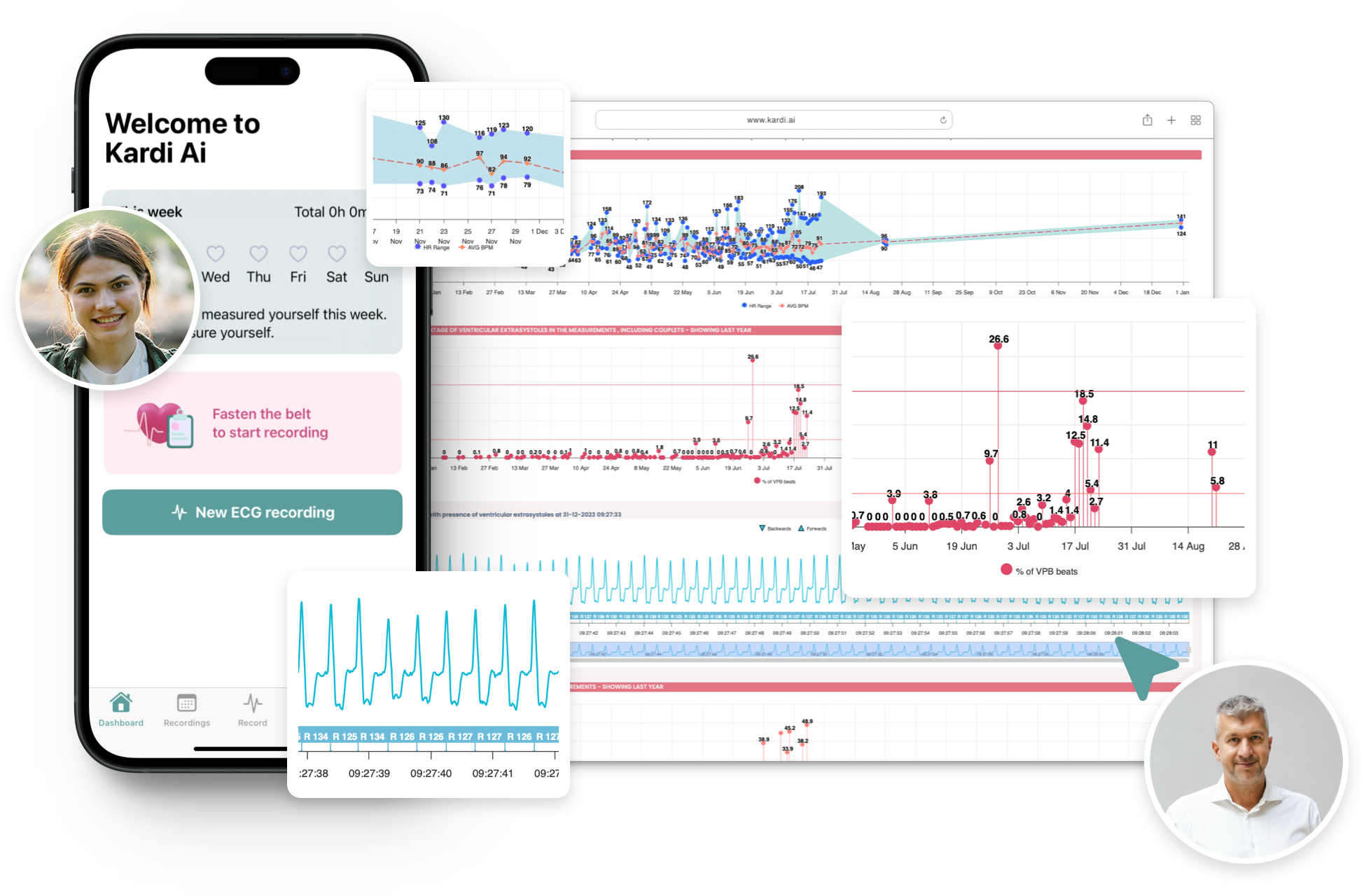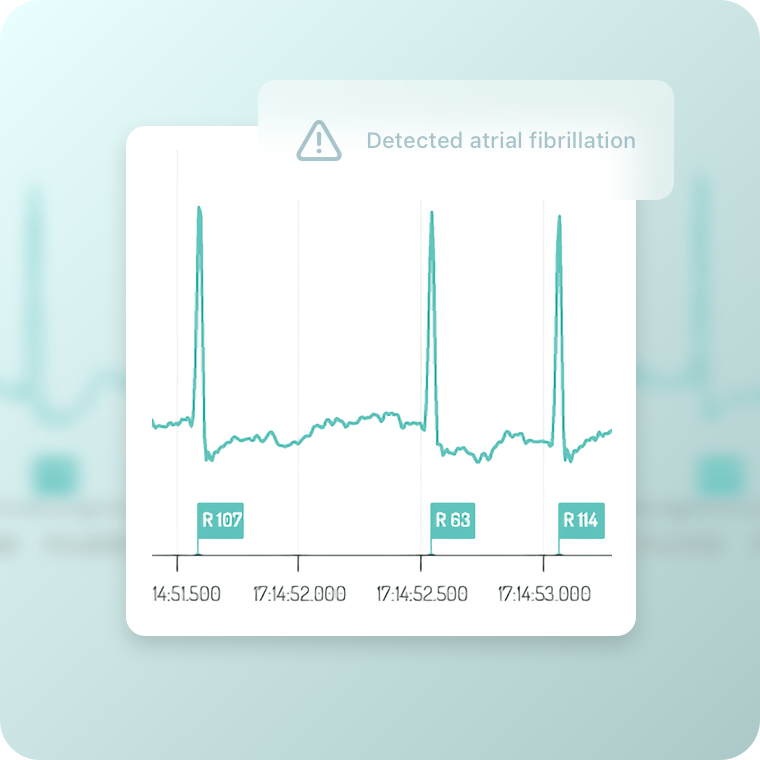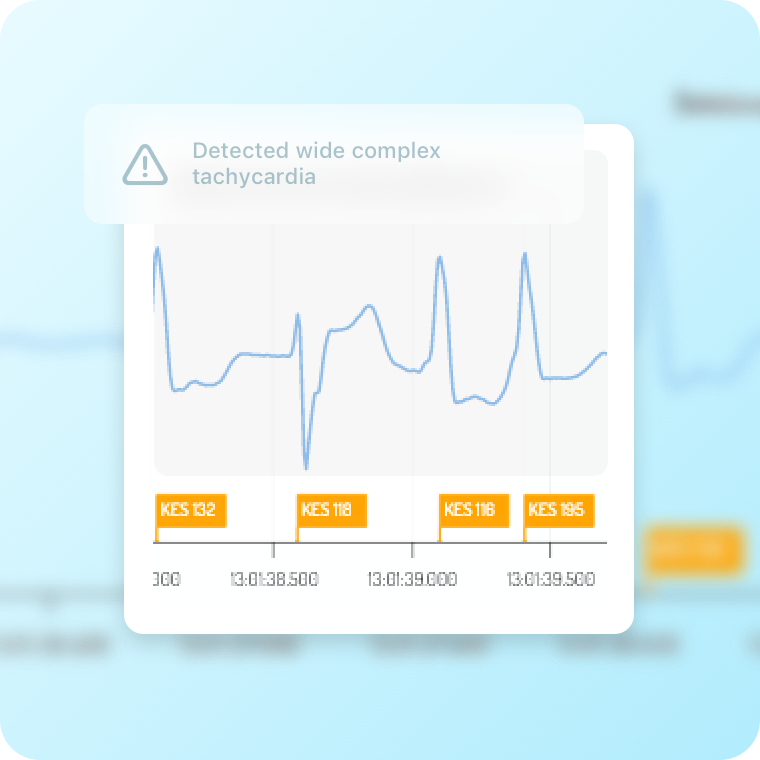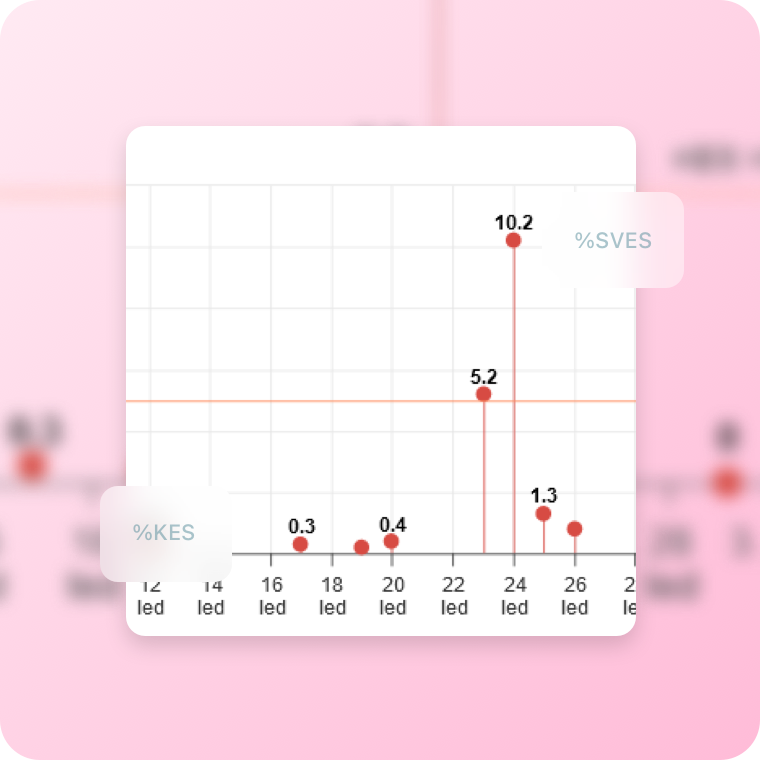Innovations in cardiac rhythm testing for healthcare providers
The high-quality ECG recorder Polar H10 in combination with a new generation of artificial intelligence Kardi Ai allows you to monitor and analyse the heart rhythm anytime and anywhere in the world.
It is well known that a whole range of arrhythmias can be detected by common methods such as 12-lead ECG and Holter ECG, yet these devices are not routinely available to patients at any given moment. Our service provides patients with a practically unlimited duration of monitoring and, in addition, the possibility of making a quick recording in times of patient need, which significantly increases the chance of successful detection and resolution of a rhythm disorder.

How Kardi Ai works

1. The belt monitors heart rate and transfers data via Bluetooth

2. The data is displayed in the patient application

3. Data is stored in the cloud

4. Artificial intelligence analyzes the data

5. Immediate feedback to the patient

6. Evaluation and diagnosis by a doctor
Benefits for doctors
An indisputable advantage is the long-term monitoring of the ECG, when the patient can be measured for weeks, months and years, as the longer and more frequent the recording, the great chance of successful arrhythmia detection. Our innovative solution provides a revolution in the prevention of cardiovascular diseases, and the patient becomes an active guardian of the health of his or her heart.
Time savings
Automatic processing of all available ECG records using artificial intelligence saves the doctor’s time and enables rapid diagnosis of a health problem.
Notification
Both the doctor and the patient receive a notification when a rhythm disturbance is detected.
Treatment management
The data obtained provide information on the effectiveness and course of treatment to date, and enable us to respond effectively to the needs of patients.
Easy access
The Doctor’s web interface stores and displays all available ECG recordings obtained from the patient including a wide range of analyses.

Exclusion of episodes of atrial fibrillation
Almost 30% of ischemic strokes are due to atrial fibrillation, which increases the risk of stroke up to fivefold. Active screening of at-risk individuals can prevent this often fatal complication. Regular intermittent ECG monitoring increases the chance of successful arrhythmia detection by up to four times compared to the conventional methods.

Diagnosis of a wide spectrum of arrhythmias
The immediate availability of the recorder allows patients to quickly record an EKG in times of difficulty. This is very often not captured by standard methods such as 12-lead EKG or Holter monitoring that must be pre-scheduled. The reason is usually the paroxysmal character of cardiac arrhythmias. In practice, these are short and unpleasant skips of the heart, a feeling of a sudden increase in pulse, episodes of weakness and inefficiency. The correlation of subjective complaints with the EKG recording is often crucial.

Effect verification and treatment optimisation
Evaluation of the benefits and risks of antiarrhythmic pharmacotherapy requires repeated recordings of the heart rhythm, but these are limited in ambulatory practice. Routine Holter monitoring is time-limited, not always available and less well tolerated. The solution is intermittent EKG monitoring in the home environment, which allows for a modern and individual approach according to the needs of a specific patient.

Rhythm monitoring after catheter ablations
Catheter ablation is the causal solution to a whole range of tachyarrhythmias. It represents the pinnacle of current treatment options. Despite its indisputable benefit, a number of people experience recurrences of arrhythmias or de novo rhythm disturbances. Close monitoring of all patients after ablation is therefore essential.
The path to more effective diagnosis and treatment
Even after diagnosis, repeated and prolonged EKG monitoring is crucial. It will help doctors with an optimal, and above all individual, approach, which leads to the reduction of complications of arrhythmias, improvement of the quality of life and in fact often saving it.
Conducted scientific trials
Polar H10 Heart Rate Sensor System
Polar Research and Technology
Evaluation of the Polar H10 chest strap ECG in patients with a wide spectrum of cardiac diseases
University hospital Olomouc
Ongoing scientific trials
KARDI AI comparison with 24-hours HolterECG in evaluation of frequent atrial and ventricular premature beats (Comparison of chest belt ECG analysis with ECG analysis from 24-hour HolterEKG monitoring in patients with frequent atrial and ventricular premature beats
Result and publication Q4/2024
A prospective monocentric study in which patients after so-called cryptogenic ischemic stroke (iCMP) will be included. The cause of stroke is very often previously undiagnosed atrial fibrillation (AF). The aim of the study is to compare the standard approach – Holter ECG monitoring against intermittent long-term monitoring using the Polar H10 chest strap. Data from the chest belt will be evaluated automatically using artificial intelligence in the KARDI AI environment. ECGs marked as FS will be manually validated by an experienced cardiologist.
KARDI AI comparison with 7-day HolterECG in atrial fibrillation screening (Comparison of the ability to detect paroxysmal atrial fibrillation from long-term intermittent chest belt ECG recording with ECG analysis from repeated, long-term Holter ECG monitoring)
Result and publication Q4/2024
A prospective, cohort, multicenter study to compare detection of premature atrial and ventricular extrasystoles verified by the Polar H10 chest belt using artificial intelligence within the KARDI AI environment against standard Holter ECG monitoring in 24 hours.
KARDI AI in atrial fibrillation screening after ischæmic stroke (the DEPACIS trial - Detection of Paroxysmal Atrial Fibrillation in Cryptogenic Ischemic Stroke patients using chest belt).
Result and publication Q4/2024
A prospective, cohort, multicenter study in subjects undergoing catheter ablation for atrial fibrillation with the FaraPulse technology. The aim of the study is to compare intermittent ECG monitoring using a Polar H10 chest belt against standard ambulatory care in the form of two 7-day Holter monitoring within 12 months after the procedure. All ECG recordings will be evaluated using artificial intelligence within the KARDI AI environment. The planned number is 200 patients, their inclusion by the end of Q3/2024 and the end of complete follow-up (a total of 12 months) by the end of Q3/2025.
Plánované klinické studie
doc. MUDr. Ivo Oral, CSc.
Olomouc, Czech Republic

MUDr. Zdeňka Pospíšilová
Brno, Czech Republic

MUDr. Pavla Gablasová, Ph.D.
Brno, Czech Republic

